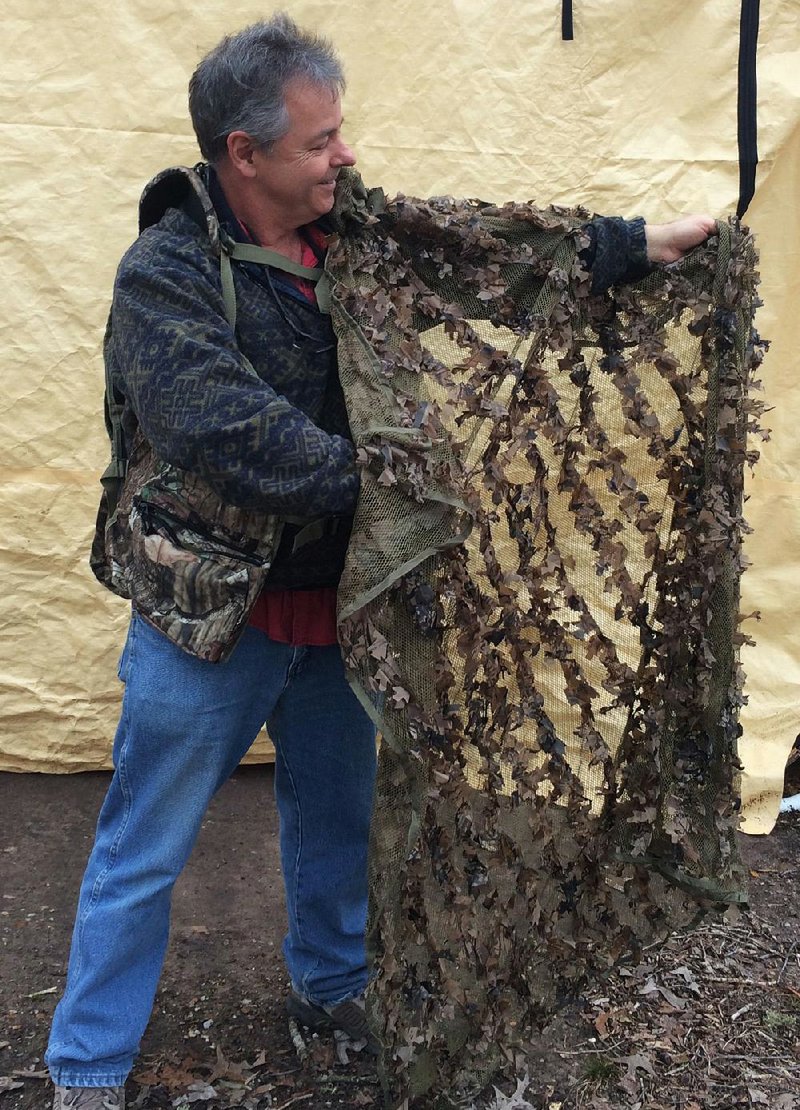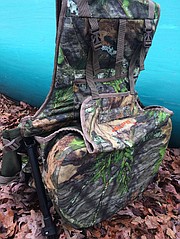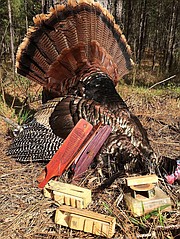We obsess about shotguns, shells, calls and boots, but turkey hunters often take their vests for granted
We throw it on without thinking much about it, but the vest is an indispensable piece of equipment. Like every other piece of gear, vest designs become increasingly specialized every year.
I have every vest I've used since I began turkey hunting in 1998. The early ones were basic, with Advantage camo, a couple of pockets for a box call and a pot call, and the "Hope Chest" in the back. It's a giant flap that clasps at the neck to form a big pouch for transporting a turkey. In Arkansas, that pouch is a symbol of indomitable optimism. Natural State hunters don't fill their hope chests very often these days, and even when we're successful, we seldom stuff a turkey into it. No, sir. We proudly carry our birds over our shoulders for the world to admire.
Of course, we really don't want anybody to see us walk out of the woods with a turkey because that might give away our spot. We'd rather text a photo to our friends with sketchy information like, "8:05 a.m. Central Arkansas Longbeard!"
Inquiries seeking more information are met with silence. If someone gets too nosy, I'll unfriend him on Facebook knowing he'll welcome us back after the season.
Such an odd, contradictory lot are turkey hunters.
In many ways, the vest is a turkey hunter's defining garment because it carries everything he might need for a day in the woods. For years I've used an official National Wild Turkey Federation vest that reminds me a lot of a vest-type backpack I field tested in 1987 while backpacking from Arkansas to Maine. That pack held an astonishing amount of gear, but it was unvented and caused me to overheat very quickly. It was no substitute for the traditional frame pack.
Not so with my turkey vest. The NWTF edition has three pockets for box calls made by Eddie Horton of Camden and Bill Rhodes of Sheridan.
Two additional pockets hold two pot calls each. There's also a chest compartment that holds four strikers. You must choose your strikers carefully because they produce conspicuously different tones. One striker works especially well with my Conway-made Turk Magnet with the copper surface. I have a custom striker for my cocobolo slate call, made by David Taylor of White Hall, and a special striker for my Diamond Cutter made by Patrick Frachiseur of Dierks.
See the pattern? We believe in Arkansas calls for Arkansas turkeys. They're deadly on Oklahoma turkeys, too.
Another chest pocket holds my mouth calls, and yet another pocket holds my finger yelpers which I use for making fighting purrs.
Interior compartments hold a bottle of water, a ThermaCell and a bag of wet tissues. I also carry my gloves and facemask inside the vest until I'm ready to hunt. My gillie suit rides in the hope chest.
As you can imagine, this is not a pack for running and gunning. I only use that much gear when I intend to spend the day sitting in one spot. A long time ago, Bob Gilmer and Jody Gilmer of Forum told me emphatically that it is unethical to hunt turkeys any other way.
That was in 1987, when turkeys were a lot more plentiful in Arkansas. Times have changed, and I don't adhere to that sentiment as closely as I once did. Sometimes turkeys get past you and you have to move quickly to get in front of them. Sometimes they simply don't show, and you have to walk to try to find them. Of course, you only do that on property with limited access where you are reasonably sure no other hunters are present.
Nimble mobility necessitates a lot less gear, and different types of vests help facilitate run-and-gun hunting.
My gillie suit is a vital garment that serves as a mobile popup blind. If I strike a bird, I don the gillie and vanish against a tree. Of course, that also means putting down my gun, contorting to reach around back to the hope chest, wrestle out the gillie and cover myself with as little noise and movement as possible.
My Quaker Boy Vest-A-Blind addresses that problem. It has an integral gillie sewn into the fabric. It is rolled up in a pouch and rides behind the neck. If you have to set up quickly, you pull a cord and deploy the gillie in seconds. It covers the entire body and face and has arm holes.
It has a pocket for a box call, a pot call and a mouth call. Smaller pockets hold an energy bar or a ziplock full of wet tissues.
The worst part of run-and-gun hunting is that sometimes you have to set up quickly without back support. If you have to wait on a reluctant bird, you can get very uncomfortable very fast.
The Alps Outdoorz Grand Slam turkey hunting vest has two telescoping struts in the back that instantly form a stable backrest. The rear of the vest is well padded.
It contains big pockets to hold calls and other items, as well as a hard plastic container on the left shoulder strap to store mouth calls. The gillie rides in the hope chest.
This pack is heavy when empty, so I carefully consider how much gear I need to carry. The payoff is that I can set up anywhere and wait in relative comfort for the most reticent gobbler.
The dilemma, of course, is trying to anticipate the nature of the day's hunt in order to choose which vest to wear.
You can overthink these things. Turkey hunters tend to do that.
Sports on 03/10/2019


